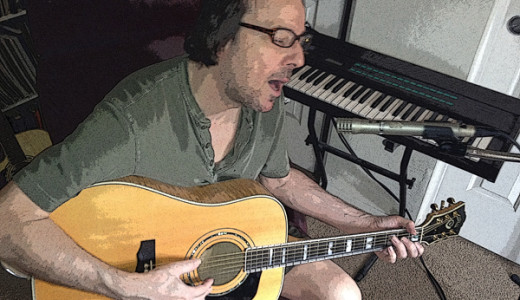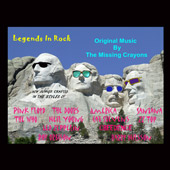Brief Musical Bio
 My interest in guitar began as a child. My father always had one or two lying around the house, though he never became an advanced player, content to know the basic chords required to perform the music he cherished most: country-western music by Ernest Tubb, Hank Williams Senior, and Hank Snow. I loved the look of a guitar, its curves and colors, its paint-trimmed F-holes, and tortoise-shell pick-guard. It was an instrument big on style. Besides, both Gene Autry and Roy Rogers played one while singing on horseback every Saturday morning – cowboy heroes bursting forth from our black and white television set.
My interest in guitar began as a child. My father always had one or two lying around the house, though he never became an advanced player, content to know the basic chords required to perform the music he cherished most: country-western music by Ernest Tubb, Hank Williams Senior, and Hank Snow. I loved the look of a guitar, its curves and colors, its paint-trimmed F-holes, and tortoise-shell pick-guard. It was an instrument big on style. Besides, both Gene Autry and Roy Rogers played one while singing on horseback every Saturday morning – cowboy heroes bursting forth from our black and white television set.
My next major fascination was years later, around 1963, when a friend had played me some vinyl albums by an instrumental band called The Ventures. Their albums were big sellers during the vacuum that existed in the years between the end of Elvis in 1960 and the debut of The Beatles in 1964. The Ventures music featured electric guitar, playing melodies of current hits by other artists, making them sound sleek and even mysterious.
They were like Pink Floyd to a generation obsessed with hot rods and surf boards. The official soundtrack.
When The Beatles arrived I was awestruck by their sound, their appearance, but felt that the ability to play such music was reserved for greater ones than I. Then, during the summer of 1965, as I drifted in the abyss between elementary school and junior high, my mother surprised me by asking if I’d like to take some guitar lessons and learn to play. I took six lessons, and four months later I was performing in a band along with three other seventh-graders, called The NewEnglanders. A real British Invasion inspired band that played the essential songs of the day: “Louie Louie,” “Hang On Sloopy,” and “Gloria.”
Our first gig was in the cocktail lounge of the nearby bowling alley. Twelve years old and we actually got paid.
That was forty-eight years ago today. Which makes me sound like I must be a relic preserved in amber. And in some ways I am. But through all of the bands, all of the many changes in styles and forms, I remain the same preschooler, still in love with the guitar, the instrument that has lost none of its magical allure.
The NewEnglanders stayed together through the rest of the sixties, changing our name to John Brown’s Underground Railway when music turned suddenly psychedelic with the Beatles release of Sergeant Pepper’s Lonely Hearts Club Band in 1967. We finally ran aground in 1969 when our manager moved to California and there was no longer anyone to book gigs for us, drive us around, and generally coddle us. This led to a lot of experimentation and soul-searching, and even some advanced study of the guitar.
By 1978 I’d been in a number of bands, learned a variety of styles, yet never landed a big opportunity. Thus I’d supported myself through a series of odd jobs. One night my father called me and announced he wanted to open a small guitar store that would focus on selling used guitars and amps. I was immediately involved and that fall Musicians Discount was born. The lessons I would learn as manager and eventually owner would play a priceless role in my education as a musician and a human being.
Thirty years after our store’s grand opening, I sold it to two employees, my father having died four years earlier, in 2004. As of today, in 2013, I still play guitar every day, write songs, and record them, as well as producing songs for others. The primary work I’ve done as a producer has been in the duo formed with Rick Connell a few years ago, called The Missing Crayons. Rick writes songs and I perform and record them, playing all of the instruments, and singing all the vocal parts, as well as writing additional lyrics and music for the songs as needed. This has been a great education for me, since I never fail to learn a little about the process, regardless of how many songs I arrange and record.
I’ve also enjoyed helping Rick to realize his creative vision for these songs and am very pleased with the results, the songs themselves, of which there are now a truckload. I would invite any and all to give these songs a listen and see if a little of the guitar’s old magic isn’t yet present, even after all of these years.

